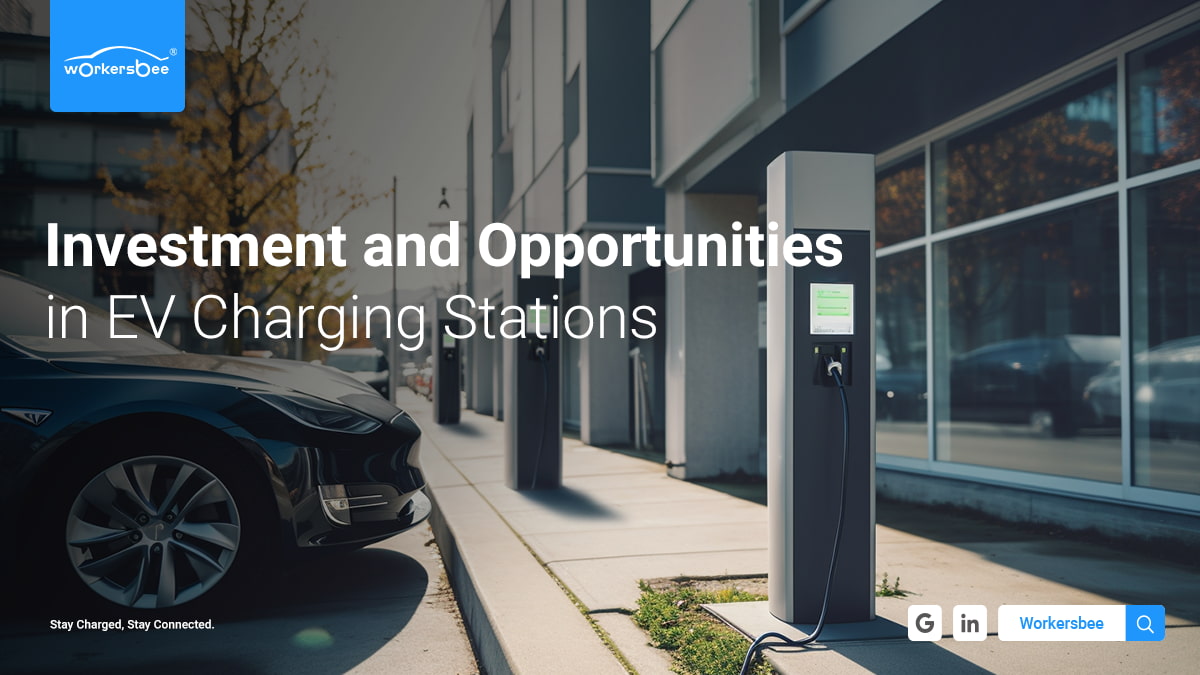 Benefits of EV Charging Stations: How Workersbee's Solutions Drive Business Growth
Benefits of EV Charging Stations: How Workersbee's Solutions Drive Business Growth
Feb 10, 2025
While many media outlets are discussing the declining trend in electric vehicle sales, actual data shows a completely different picture. Sales of plug-in vehicles, including BEVs and PHEVs, continue to grow steadily, not only in mainstream markets but also in regions with smaller markets, showing remarkable growth in countries such as Brazil, Singapore, and Russia. The share of EVs in modern transportation is gradually increasing.
We cannot deny the positive impact of EV adoption on the environment and climate, and we all understand the crucial importance of sufficient, well-developed charging infrastructure. In addition to public utilities, energy companies, automakers, charger manufacturers, and operators, businesses should also actively embrace this new market opportunity.
As a global leading provider of EV charging plug solutions, Workersbee is dedicated to the mission of “Making Charging CareFree.” In this article, we would like to explore with you the value of businesses installing EV chargers and building charging stations, and how we can support your business.
Economic Value
· Generate Revenue: Businesses that build public charging stations can attract EV drivers to charge their vehicles. These drivers will pay for charging based on duration or times, creating direct charging income. For long-term customers, businesses can offer membership or prepaid discounts, allowing customers to prepay a certain amount for charging and receive discounts. This helps build customer loyalty and satisfaction. Additionally, more revenue can be generated through cooperative advertising or other business partnerships.
· Government Subsidies or Tax Incentives: Depending on the region, governments may provide subsidies or tax incentives to support the installation of chargers, which can reduce the investment and operating costs for businesses.
· Increase Property Value: Installing charging stations in apartment complexes can attract more tenants and enhance rental value.
· Boost Business Revenue: Charging points can attract foot traffic, creating more business opportunities and improving customer satisfaction. Establishing an eco-friendly brand image builds trust with customers, increasing collaboration opportunities.
Environmental Value
· Address Climate Change: EV adoption significantly reduces greenhouse gas emissions, and a robust charging infrastructure encourages more drivers to adopt electric vehicles, helping businesses realize their environmental goals.
· Improve Air Quality: EVs efficiently use energy and emit no exhaust gases while driving, which helps reduce air pollution and improve air quality.
· Promote Renewable Energy: Combining EV charging stations with renewable energy sources like solar and wind can reduce the use of fossil fuels, increase energy efficiency, and promote technological advancement.
· Foster Sustainable Development: Installing EV chargers helps businesses build a sustainable, eco-friendly image, win more business, and take on social responsibility for environmental protection.
Strengthening Business Competitiveness
· Enhanced Employee Benefits: Installing EV chargers at the workplace allows employees to charge their vehicles for free or at a discounted rate during working hours, significantly improving employee loyalty and satisfaction. It also encourages more employees who are hesitant to switch to EVs.
· Improved Customer Satisfaction: Visiting customers or business partners can charge their vehicles at the workplace, boosting the company’s eco-friendly image and garnering more collaboration and recognition. This increases customer return rates and loyalty and builds confidence in future cooperation.
· Increased Foot Traffic: Restaurants, hotels, and shopping centers with charging stations can attract more EV drivers, extend their dwell time, and increase spending.
· Enhanced Corporate Image: Establishing charging stations helps businesses gain greater brand visibility and competitiveness in the marketplace.
How Workersbee’s Customized Charging Solutions Can Help You
As an experienced EV charging equipment manufacturer, Workersbee offers a comprehensive range of charging solutions, including AC and DC products. These include portable EV chargers, charging plugs, sockets, cables, and adapters, providing all-around support for your business.
Our technological innovations never stop. Our pioneering experts, active in global markets, continue to achieve breakthroughs in product efficiency, reliability, and safety. Our strict product control and large-scale production ensure international certifications such as CE, UL, and TUV, enabling our charging plugs to deliver higher power output while maintaining safety and stability, making charging easier.
We also maintain world-class cost control. With modular design, automated production, and full supply chain control, we are confident in the cost-effectiveness of our delivered products.
Our technical team works closely with your business team, providing customized solutions based on nearly two decades of industry experience and localized research.
Conclusion
With the rapid growth of the EV market, the demand for charging infrastructure will continue to increase. Governments worldwide are showing strong support for charging infrastructure, with favorable regulations and policies continually emerging. Installing EV chargers or building charging stations is a market trend that businesses cannot ignore.
Not only can businesses generate charging-related revenue and achieve significant economic returns, but they can also enhance customer and employee satisfaction and loyalty. Furthermore, by promoting sustainable development and establishing a solid eco-friendly image, businesses can strengthen their competitiveness.
Workersbee remains committed to providing efficient and safe charging solutions, helping businesses achieve sustainable growth and profitability. We look forward to discussing how we can leverage our strengths to enhance your market competitiveness and jointly drive the adoption of electric vehicles.
Read More

 Benefits of EV Charging Stations: How Workersbee's Solutions Drive Business Growth
Benefits of EV Charging Stations: How Workersbee's Solutions Drive Business Growth